Interested in the best apps to learn Portuguese?
A modern world requires modern language learning techniques, and with an endless range of language learning apps, you are sure to find one you like.
What’s in this article?
- Can you learn Portuguese with an app?
- Why you should learn Portuguese with an app
- How to learn Portuguese with an app
- The best apps to learn Portuguese
Can you learn Portuguese with an app?
Yes and no.
When it comes to language learning, no single book, course or app will be able to give you all you need.
So while you definitely can learn Portuguese while using an app, whatever application you are using won’t be the only thing you need to get fluent in Portuguese.
In the end, learning a language comes from actually interacting with it, so while an app is a great place to start, don’t expect it to be the only thing you’ll need.
That being said, apps are a great way to start your language learning journey for several reasons:

Why learn Portuguese with an app?
Gamification
Most apps have fine-tuned the process to make it as easy and enjoyable as possible while covering some of the most important topics.
Each app has its own approach, but ultimately you’ll learn Portuguese regardless of which specific app you choose.
Low entry
One of the best things about learning through an app is that it’s so easy to get started.
Most applications are either free or offer a free trial, so you can always check it out and see if this particular app is something for you.
Expertise
Though the process of learning through an app may seem easy, most apps have a large team of linguists and language learners dedicated to making sure the content you are learning is actually helpful.
Though some of the phrases may seem strange (Yes, Duolingo, I am looking at you), people have thought about them.
The randomness of some sentences can help you really think about what you are saying rather than just writing things on autopilot.
How to learn Spanish with an app?
Create a daily routine
You can learn a language while riding the bus or waiting for your dentist appointment. The best way to make sure you practice is by making it a part of your daily routine. Look at what your day looks like, and see what activity you can pair it with (e.g. a daily commute, while eating breakfast, after brushing your teeth).
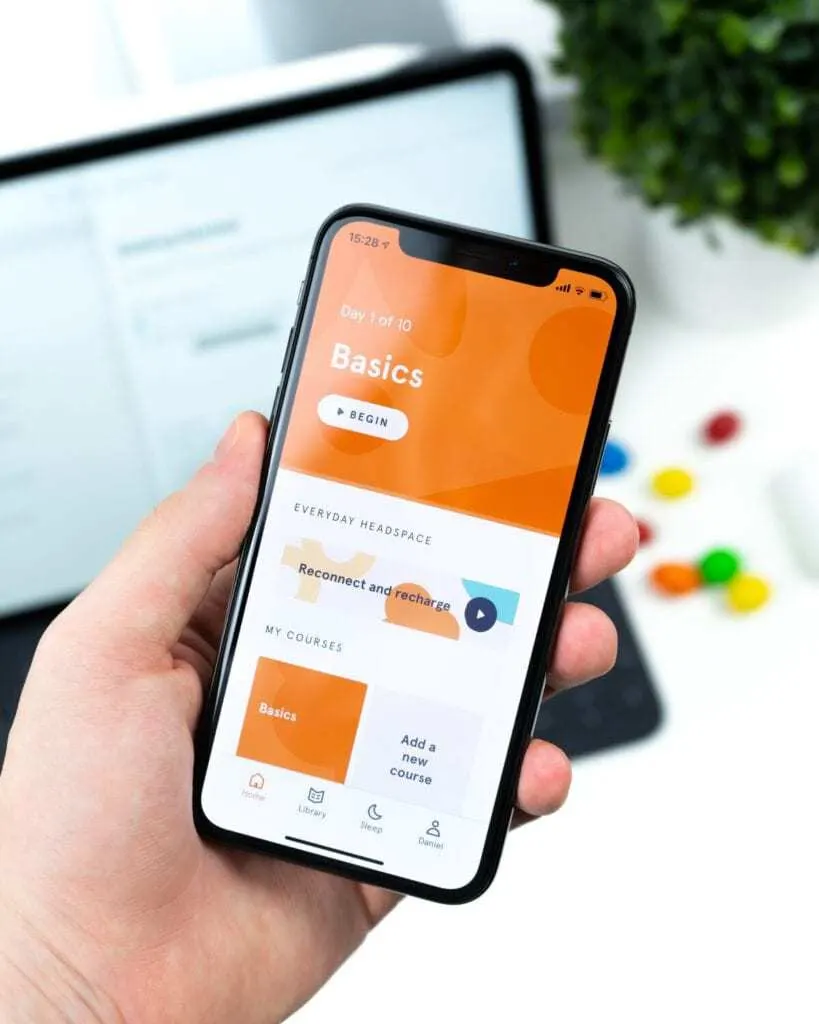
Find one that fits your needs
Every language learner has its own goal, and every app has its own focus, and it’s important to understand both of these things.
Write down what it is you are trying to achieve (speak a language on holiday, understand cinema or literature, etc.)
Try finding an app that matches that goal.
There are loads of great options out there, but not every app may be the best fit for you.
Take notes
While it’s very convenient to do everything on your phone, studies have shown that writing something down makes it easier to remember.
Don’t be afraid to take some physical notes, if only to have a general overview of the things you’ve learned.
Make it social
While many apps already have some sort of competition element, there is nothing like doing something with a friend. Try to find someone around you who would also like to learn a language.
It doesn’t have to be the same one, as long as you can keep each other interested and engaged.
Don’t forget to speak
It’s easy to casually use an app while typing the answers, but don’t forget to actually practice actually speaking it.
Pro-tip: if your language learning app doesn’t have a function for speaking, you can always type with voice recognition. Select your target language as one of your keyboard options, and instead of typing the answer, you can use your voice command. If the word you are trying to say doesn’t appear, you are probably saying it wrong.
List of best apps to learn Portuguese
I’ve listed the best current apps with some screenshots I took while trying them out. I tried my best to try out different features, free and premium, to find out what makes each app unique.
I’ve also added my personal rating based on which apps I think are most helpful, but this is of course based on my own personal preferences and experiences as a polyglot, and others may disagree.
All apps mentioned in this list are great and have many users who enjoy their features.
So, without any further ado, let’s get into the best apps to learn Portuguese.
► Memrise
Free: beginner courses
Premium: €8.99/month
Rating: 9/10
Interesting features:
- videos of native speakers,
- literal translations for common expressions
- a cool camera feature
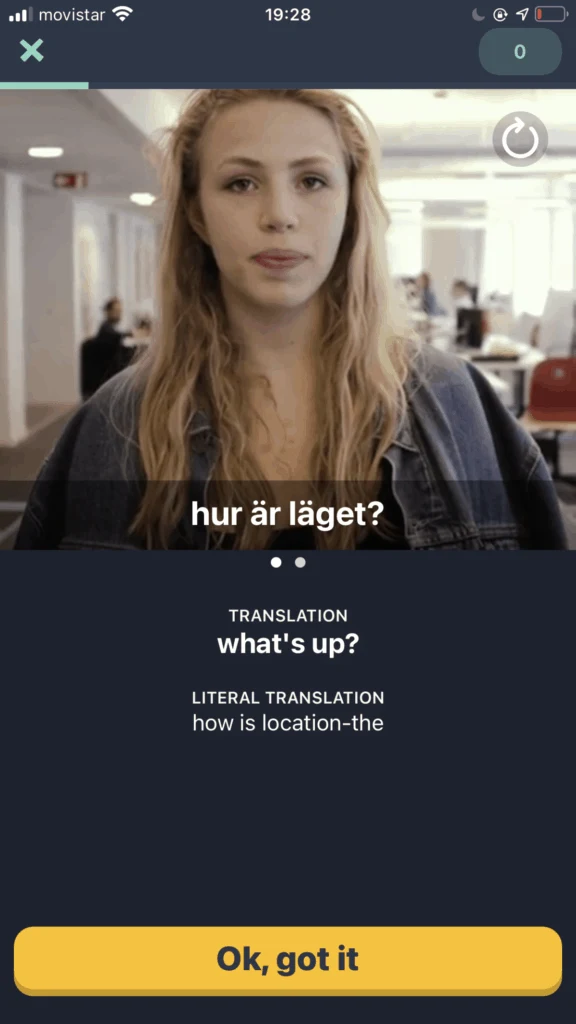
One of my personal favorites, not only because of the way it works but mostly because of the wide variety of small and unknown languages. It’s like a candy store for those who enjoy learning languages.
According to their site:
“Memrise is an online learning tool with courses created by its community. Its courses are mainly used to teach languages but are also used for other academic and nonacademic subjects (such as trivia, video game trivia, and pop-cultural). Memrise uses flashcards augmented with mnemonics (known within the service as “mems”)—partly gathered through crowdsourcing—and the spacing effect to boost the speed and ease of learning.”
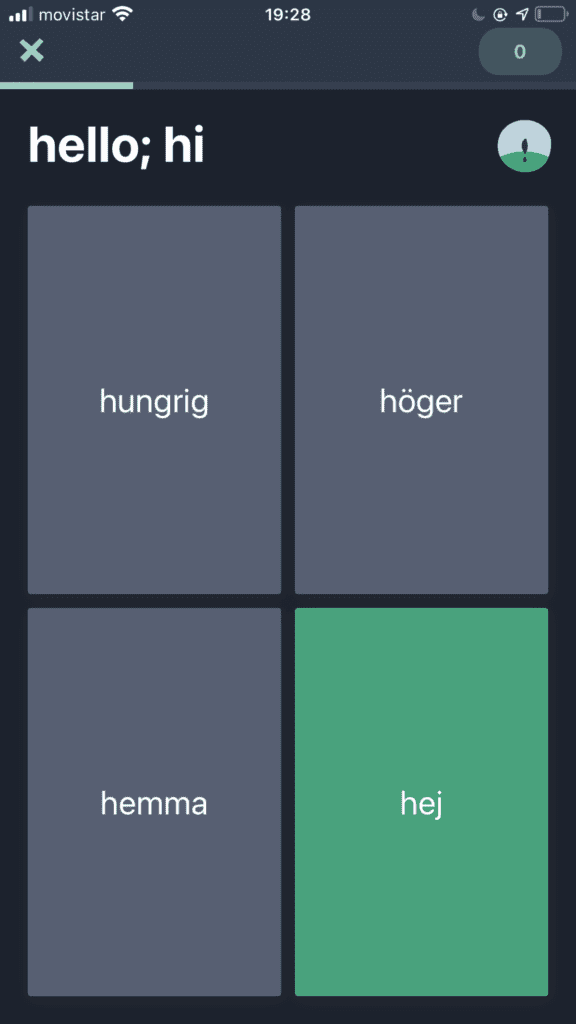
What I like about Memrise is that the courses are easy to follow, and usually have nice videos of native speakers or pictures to accompany the word you are learning. Additionally, they give you a literal translation for common expressions, which really helps you to understand what people are saying.
They also have a really cool camera feature that allows you to find the name of colors, objects, and other things while simply walking around.
Overall, a very solid language learning app with interesting additional features. Can’t go wrong with Memrise.
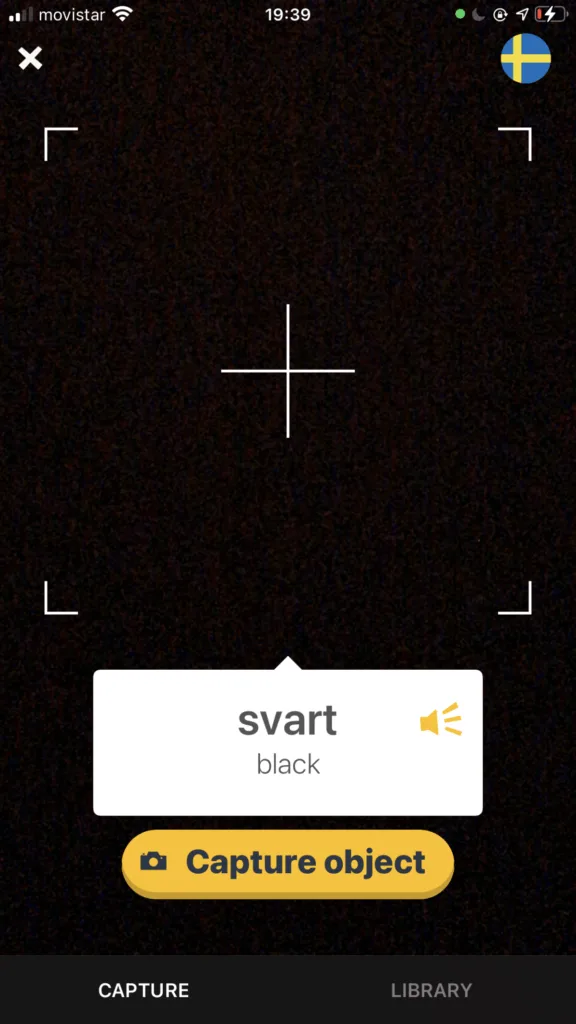
► Audible
Free: One book
Premium: $14.90/month
Rating: 8.5/10
Interesting features:
- Audio-based learning
- Language learning courses
- Original content
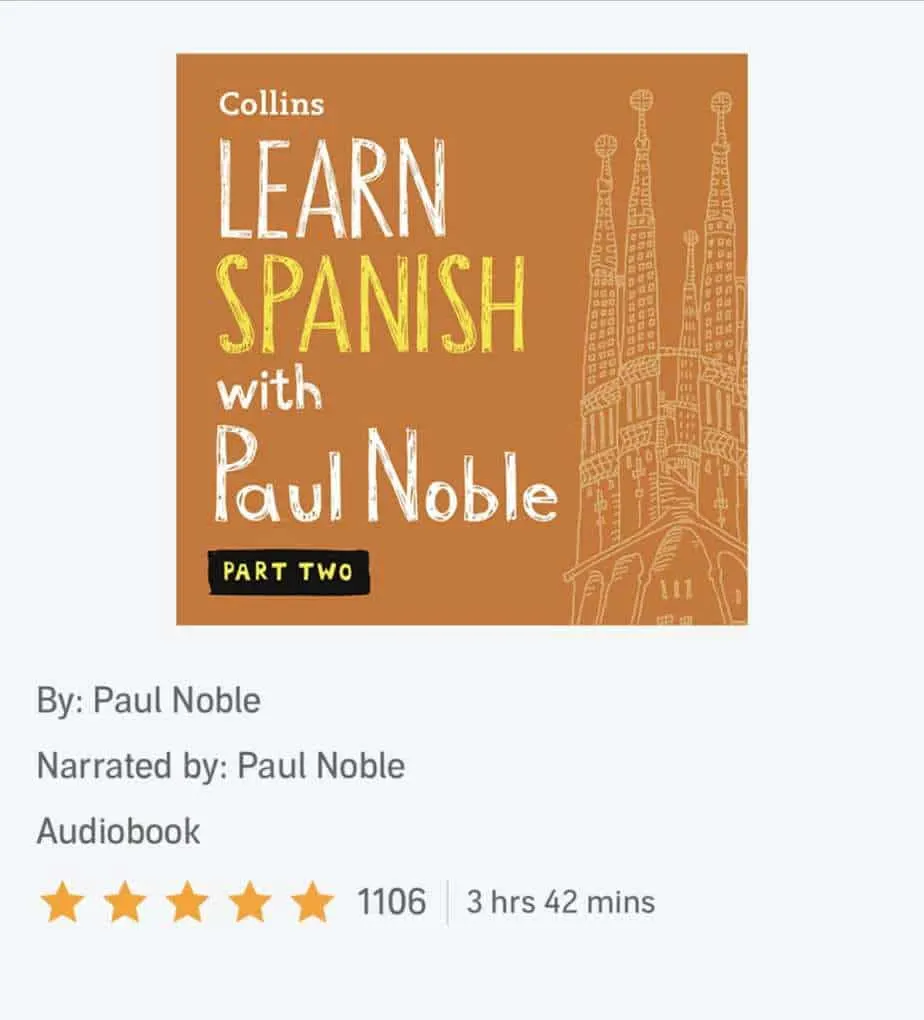
You might not immediately think of it, but Audible is a great tool for language learning. Not only do they offer loads of highly-rated Paul Noble courses for various languages (including Spanish, French, Italian, German, Japanese, and Mandarin), but they also have loads of other audiobooks in various languages.
Whether you are a beginner or advanced learner, you’ll surely find something on there.
I’ve loved some of the beginner courses, but my favorite part is listening to regular audiobooks in languages I am already more advanced in.
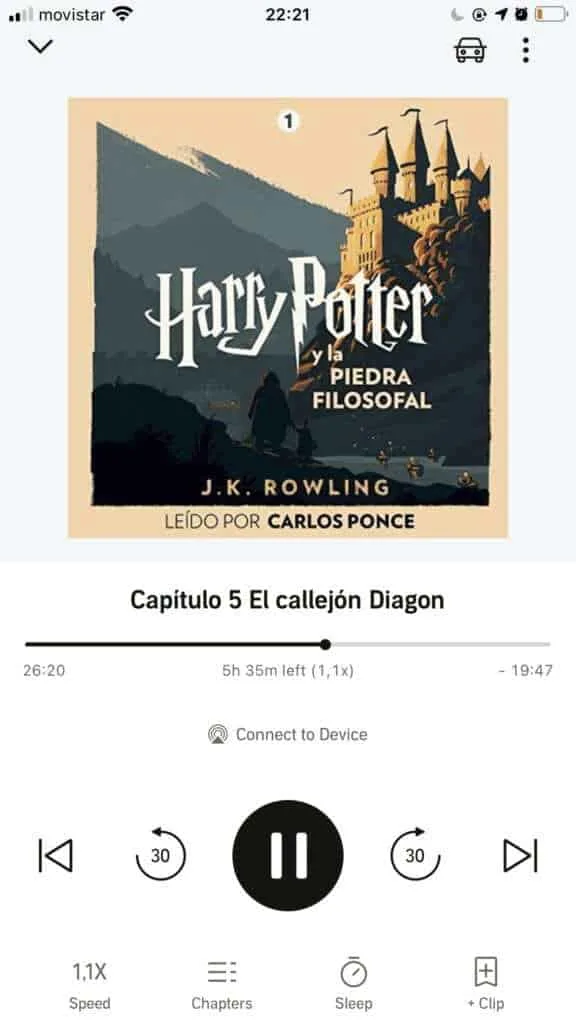
They also have other great linguistics-related content such as the book “Because Internet“, which is all about how the internet has changed the way we use language.
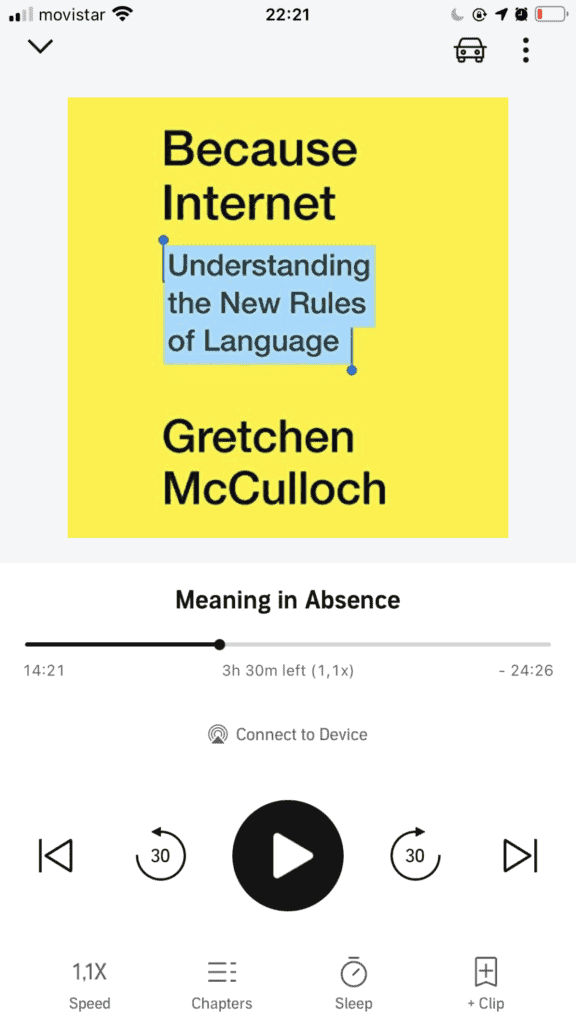
You can get a book for free during your 30-day trial. Cancel anytime, and the book is still yours.
Audiobooks are a great way to work on your listening skills and pronunciation. Find out what kind of audiobook best matches your skills and how you can get one for free.
Additionally, we have suggestions for audiobooks in Spanish, German, Italian, French, and Portuguese.
I can personally tell you that Audible is one of the best apps to learn Portuguese and improve your listening skills.
► Babbel
Rating: 8.5/10
Interesting features:
- intuitive, clean layout
- in-app podcasts
- helpful blog
Another famous app for language learning. It probably works among the same ideas as Memrise, only it has fewer languages, but has a better worked out a program for these offered languages.
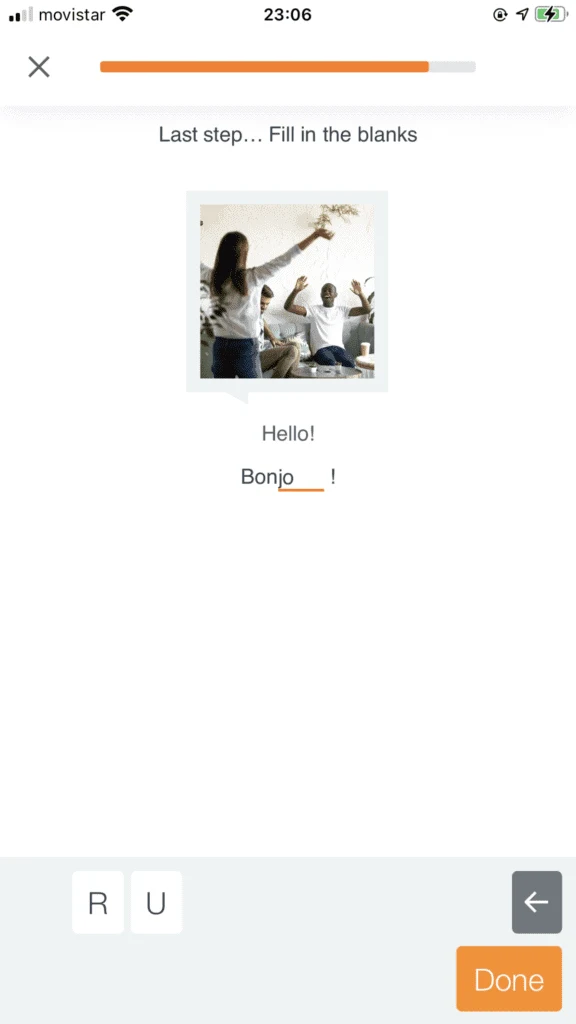
“Founded in 2007, Babbel is the world’s first language learning app. A leader in the online language learning industry, Babbel is an international success with millions of active subscribers and ranked as the world’s #1 innovative company in education.
Our meticulously designed courses guarantee you language skills you can use right away. Babbel is the shortest path to real-life conversations; 73% of our users indicated that they’d be able to have a short, simple conversation in their new language within five hours of using Babbel.”
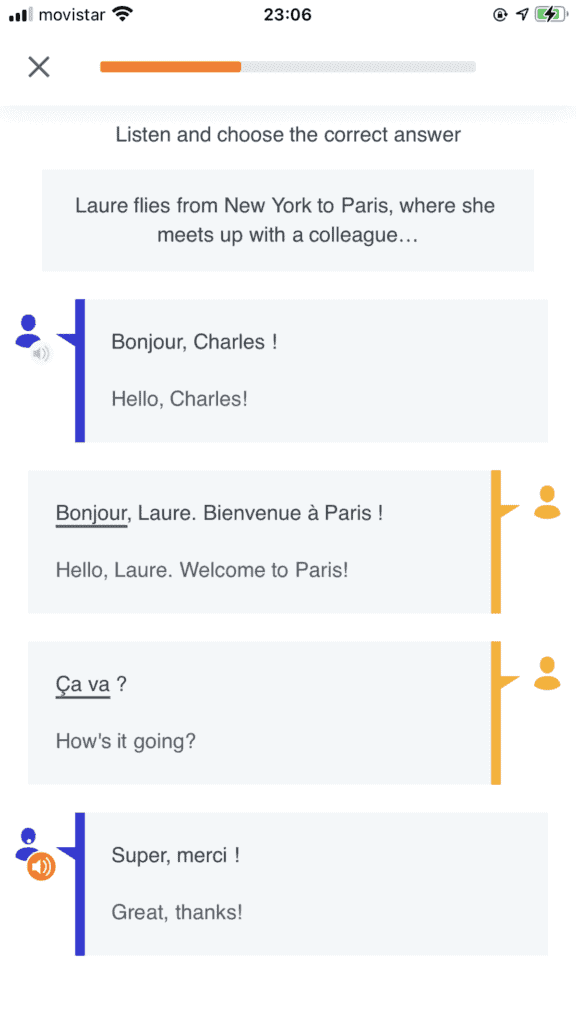
The nice thing about Babbel is that they have a website where they post things about language learning, like a post for Brazilians learning English on how to improve their pronunciation or a post on why learning a language on a cell phone can actually make a difference.
One of their coolest features is the podcast episodes, made for language learners. They are an entertaining and engaging addition to the education they provide, and having it inside the app rather than having to switch to another podcasting app is kind of neat.
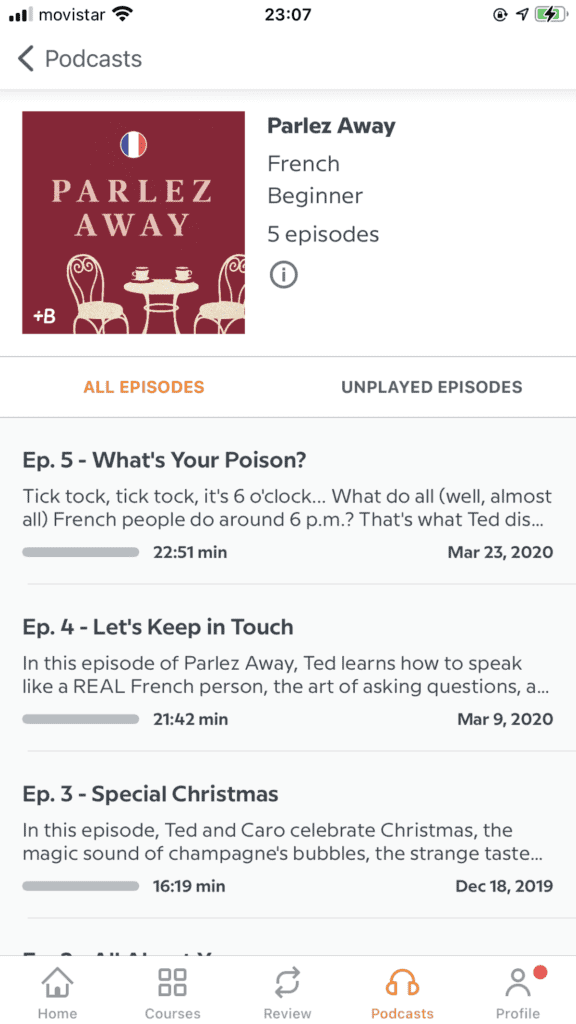
Babbel is one of my personal favorites, as it seems to have fewer random sentences than Duolingo. The lessons are clear, and well-structured, and I think would recommend it for sure.
► Duolingo
Free: Forever
Premium: $6.99 a month
Rating: 8/10
Interesting features:
- Free forever
- Courses in other languages than English
- Great selection of courses
- Interesting competition element
Now, this post wouldn’t be complete without a mention of the infamous green owl.
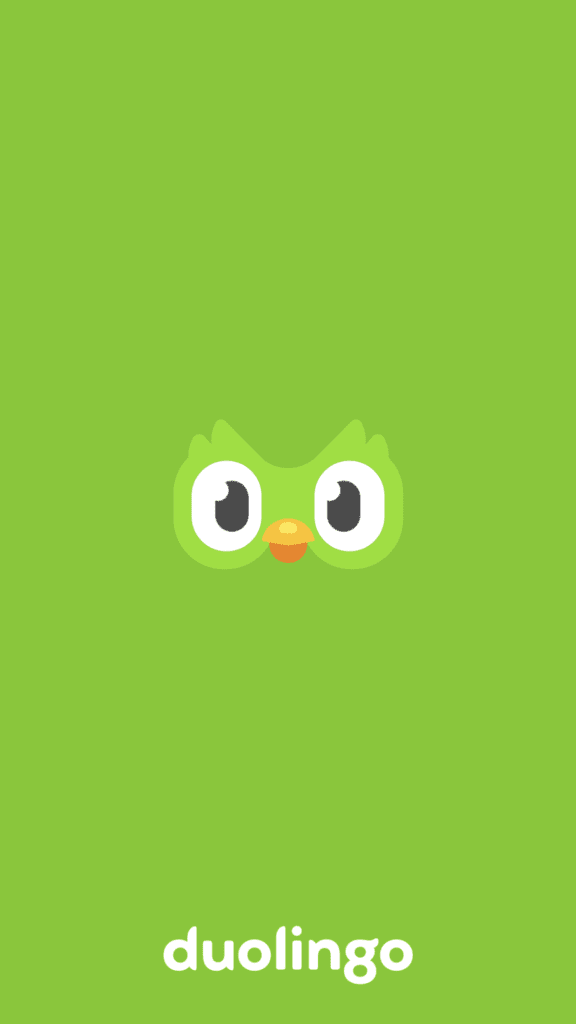
A classic in the language learning industry for their gamified free courses and persistent owl mascot.
According to their site:
“We believe that anyone can learn a language with Duolingo. Our free, bite-sized lessons feel more like a game than a textbook, and that’s by design: Learning is easier when you’re having fun.
But Duolingo isn’t just a game. It’s based on a methodology proven to foster long-term retention, and a curriculum aligned to an international standard. Let’s explore how language learning happens with Duolingo!”
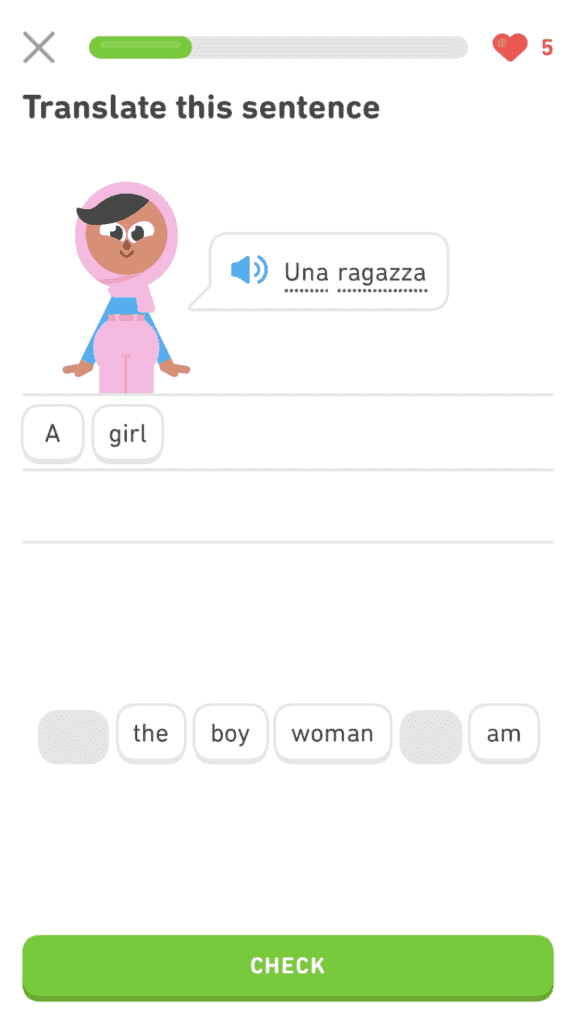
It only offers a great variety of languages, but more importantly, they offer courses that aren’t in English. This means that instead of going English to French, you could do German to French, or French to German, or German to Spanish.
This is especially great when it comes to minority languages like Guarani and Catalan being offered in Spanish, making it accessible to a group of people that might be interested in learning this language without them having to be fluent in English in order to take the course.
Honestly, Duolingo receives a lot of criticism, and while it is not my personal favorite, I think we need to acknowledge how amazing it is they are able to offer gamified language education for free. Increasingly, they are adding smaller minority languages, which is also a big plus.
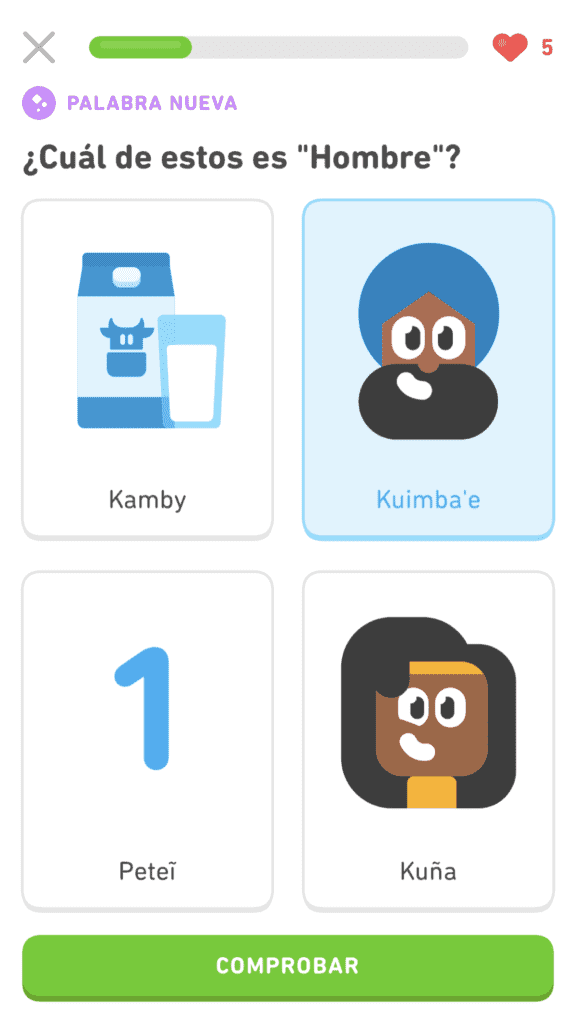
Overall, it’s a classic in the language learning industry, and though I don’t think it is the best app for learning a language, it is the only app offering a full program for free.
Millions of people have used it to learn Portuguese, so it’s definitely up there with the best apps to learn Portuguese.
► Drops
Free: Basic classes, 7 day free trial
Pricing: €9.99/month, €69.99/year, €199 lifetime
Rating: 9/10
Interesting features:
- Visually appealing
- a wide range of languages
- a collection of words
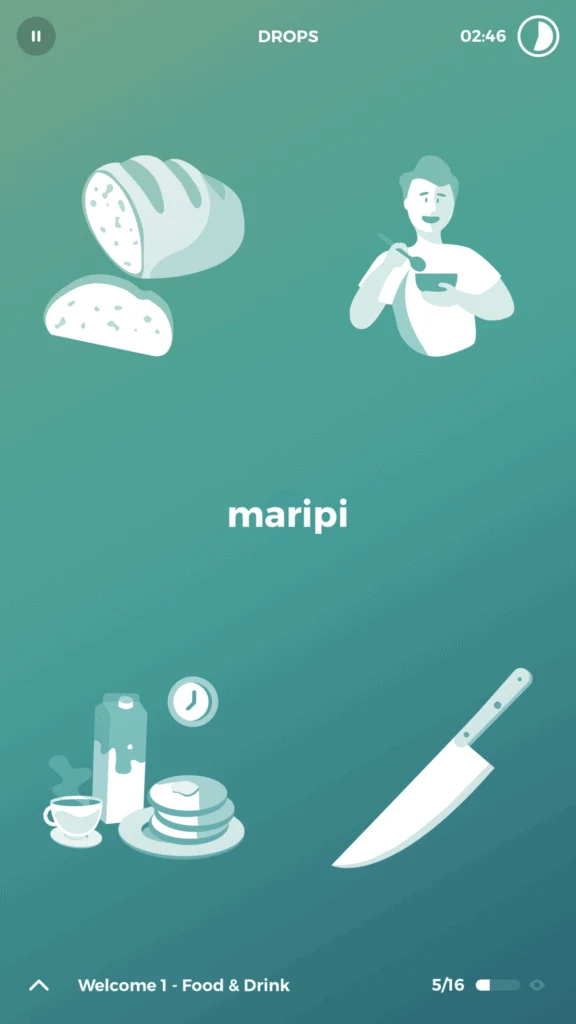
Drops is an app that until recently, I had not heard about, but quickly grew to be one of my favorites.
According to them “Drops is the new and fun way to learn languages. By combining beautifully designed word games with mnemonic associations, it developed a cult following, becoming the fastest-growing language learning app in the world.
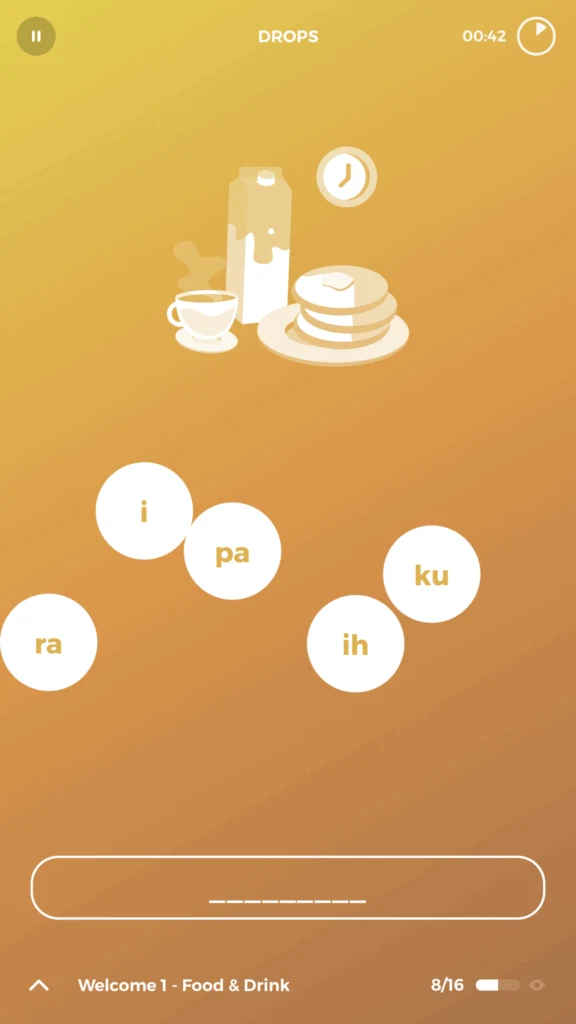
The short, engaging games make language learning a fun part of your daily routine and not a chore. It’s easy to learn one or more of Drops’ 35+ languages. While fun and simple, the beautifully designed app is built with years of research into how to help you learn a language more effectively and easily.“
The amazing visuals make it a great and very satisfying experience, which I really appreciate. I also love the languages they offer (including Maori, Samoan, and Esperanto).
The courses seem well-structured and adaptable, and the games are fun and engaging. Overall, a great language learning experience.
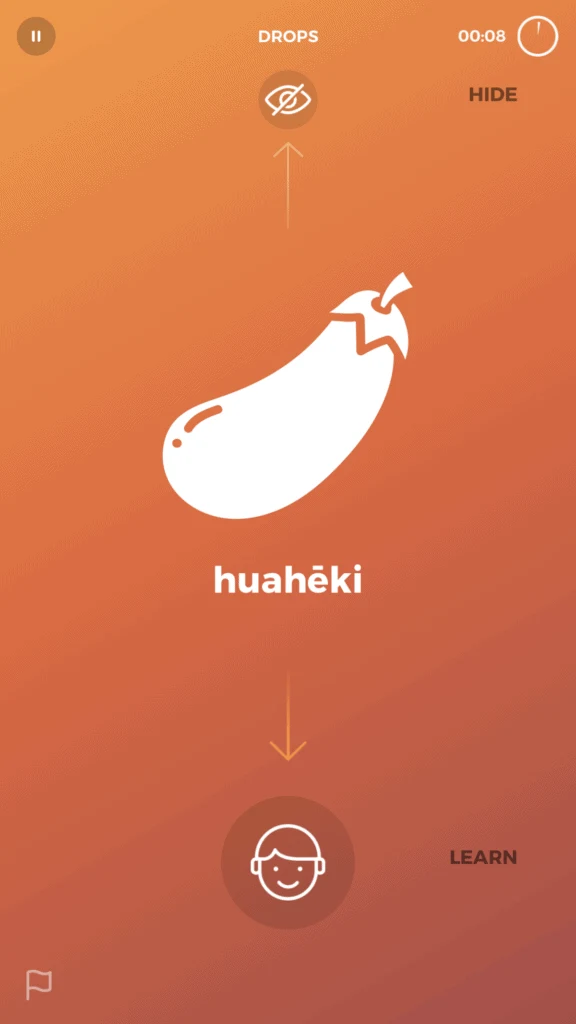
► iTalki
Free: Usually one free trial class per teacher
Pricing: Anywhere between $5 and $40 per class
Rating: 9/10
Interesting features:
- You can pick your own personal teacher
- Wide price range
- Pick your own times
Most of the apps mentioned here are gamified language courses, but of course, there is nothing like a real-life teacher.
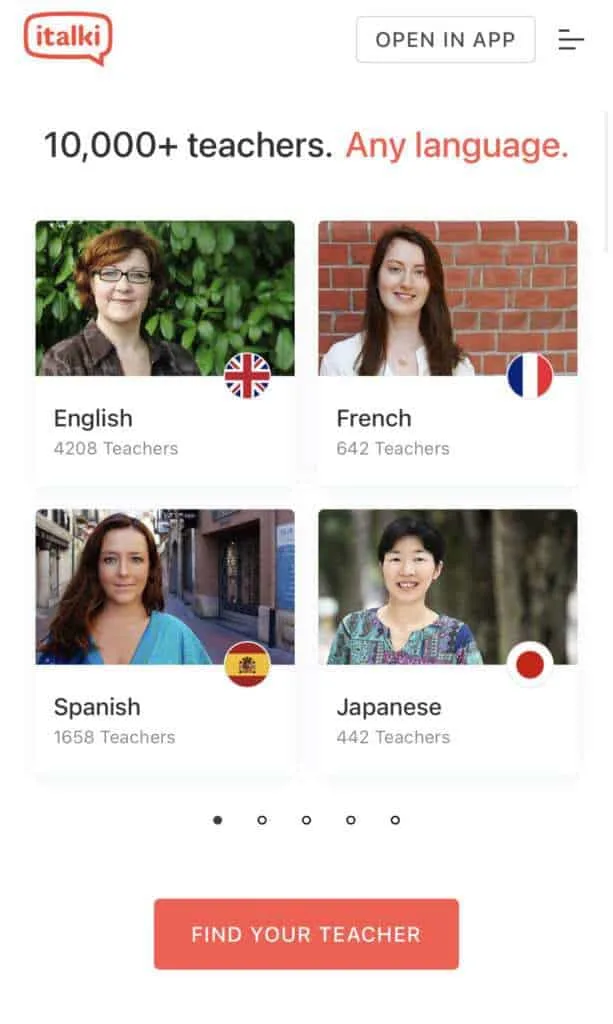
I’ve used iTalki for personal classes, and while the idea of a personal teacher may seem pricey, you can find teachers at any pricepoint.
I’ve personally found it really helpful to be able to really talk with someone rather than just practicing by myself. All teachers were amazing at adapting to my personal needs, so while this may be a bit more expensive than a free Duolingo course, you definitely get your money’s worth.
So, while this may be a bit different from other apps discussed in this post, I would highly recommend it to anyone who hasn’t tried to out yet.
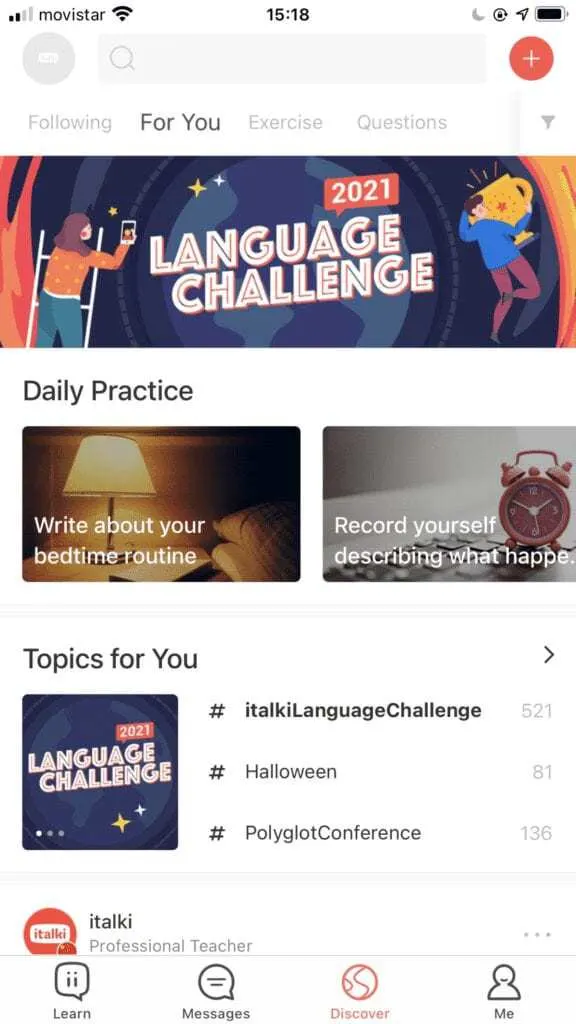
From personal experience I can say iTalki is one of the best apps to learn Portuguese if you are serious about getting fluent.
► LingQ
Free trial: until 20 LingQs
Premium: €13.99 a month
Rating: 6/10
Interesting features:
- Program adapted to your interests
- Newspaper articles
- Translation on click
I was quite excited to try this app because I have some friends that swear by it. However, I myself was a bit underwhelmed.
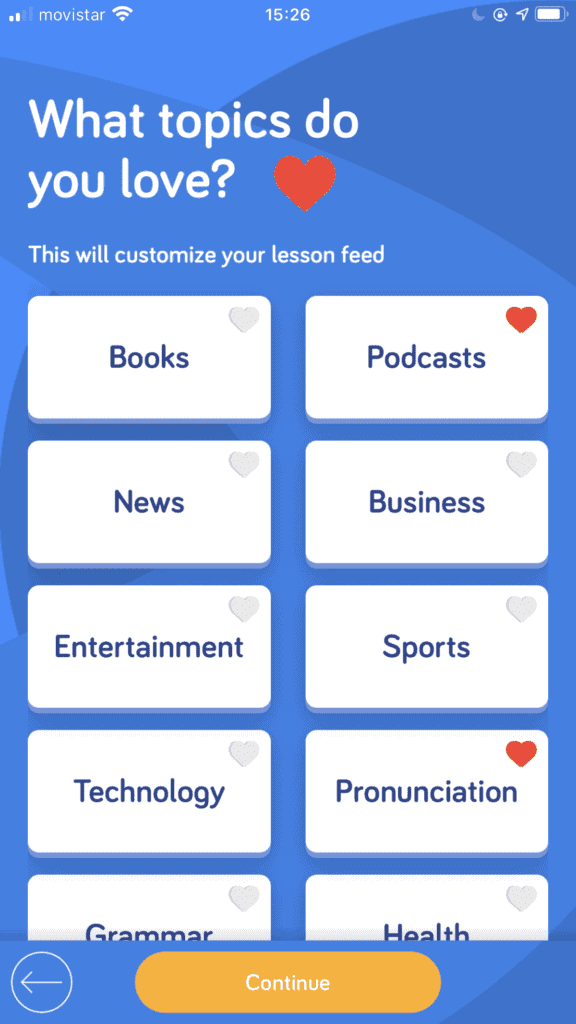
I enjoyed the idea of reading things with a translation provided. But beyond that, there wasn’t much structure, and the whole thing just seemed a bit random. I can see the appeal of it, but I would expect this to be part of a larger app that provides a bit more structured content as well, like Babbel or Mango Languages.
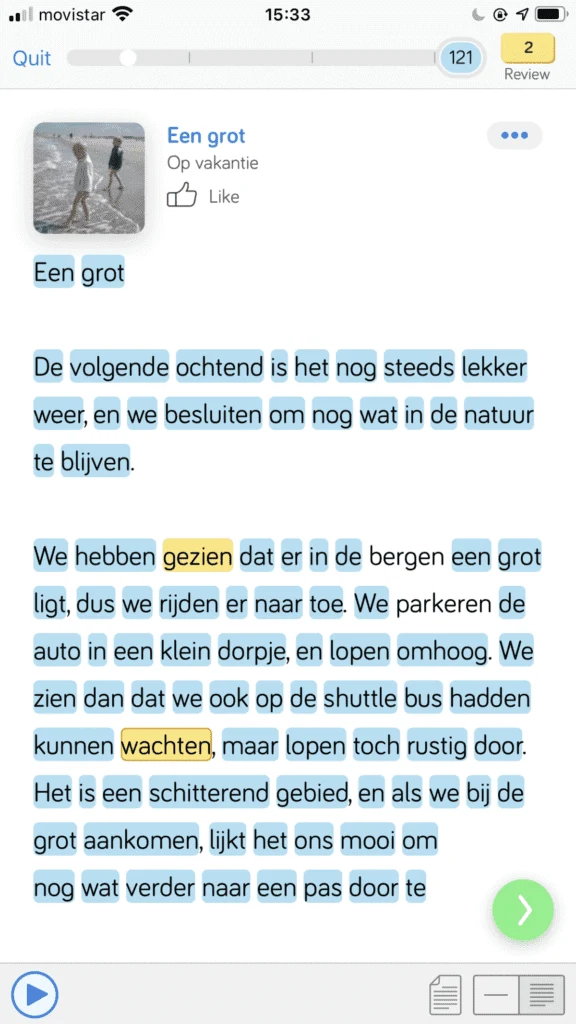
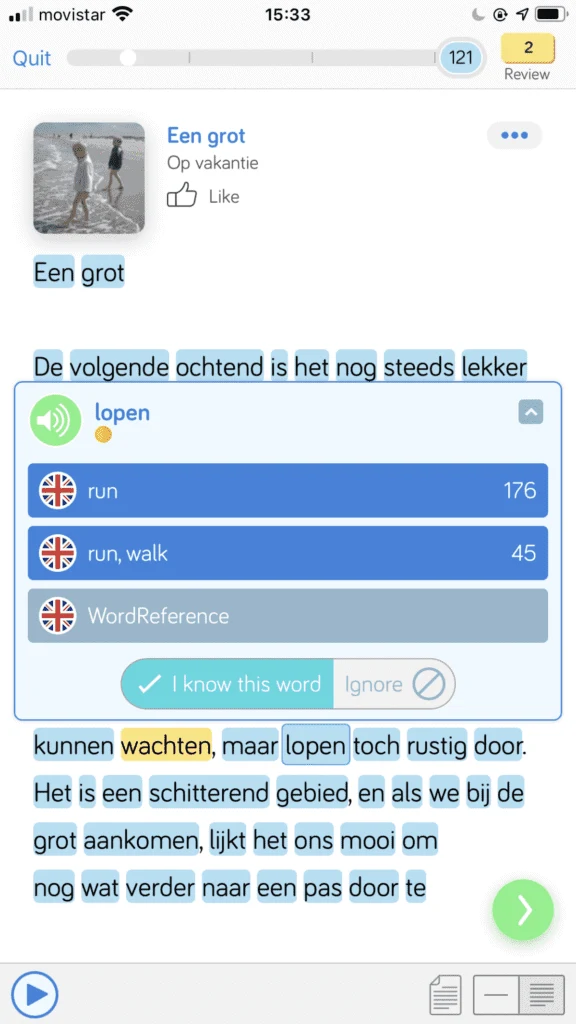
That being said, there is loads of content available in audio and written form, with translations provided, and if you already have an idea of the grammar of a language I would recommend it in order to improve reading.
► Rosetta Stone
Free trial: Basic lessons
Pricing: $20 a month
Rating: 6/10
Interesting features:
- Short stories to read
- Pronunciation based
- Long history of language education
Rosetta Stone is iconic when it comes to language learning.
Way before apps were a thing, they created robust and interactive language courses. But how does their technology hold up in 2021?
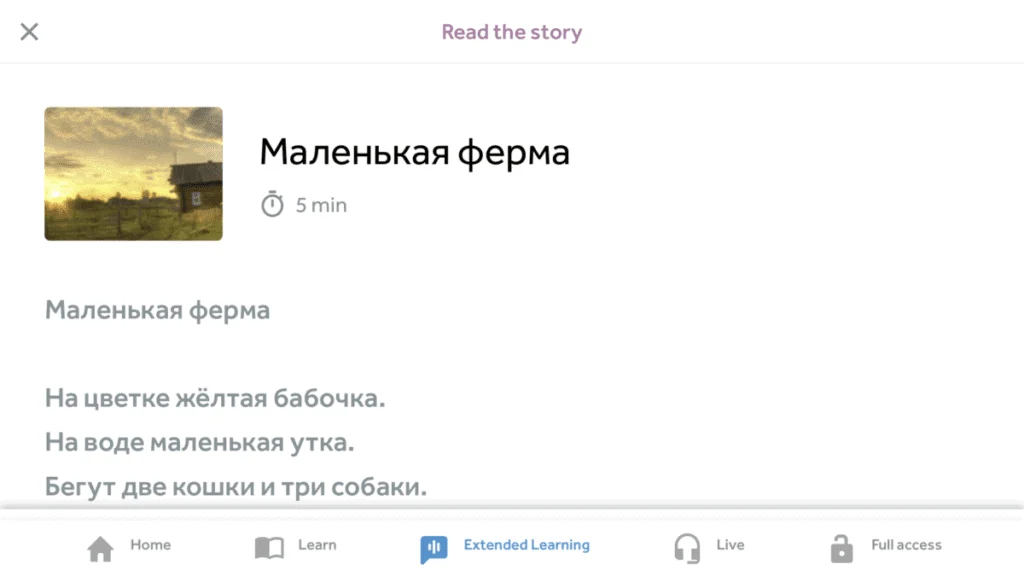
Though I can’t say it’s a bad app, I was a bit underwhelmed. The fact you have to turn your screen is somehow quite bothersome, and in comparison to some of the more recent language learning apps, I think you can get a lot better for your money.
Don’t get me wrong, the courses have proven to be effective, so I don’t think it’ll ever be a bad choice, but in terms of user friendliness I would pick another app.
► Busuu
Free: basic classes and 7-day free trial
Premium pricing: € 9,99 / month
Rating: 7/10
Interesting features:
- Community function
- Well-structured
- Cultural notes
Busuu is quite a popular app. I know many people who swear by it, but for me, it didn’t seem particularly special.
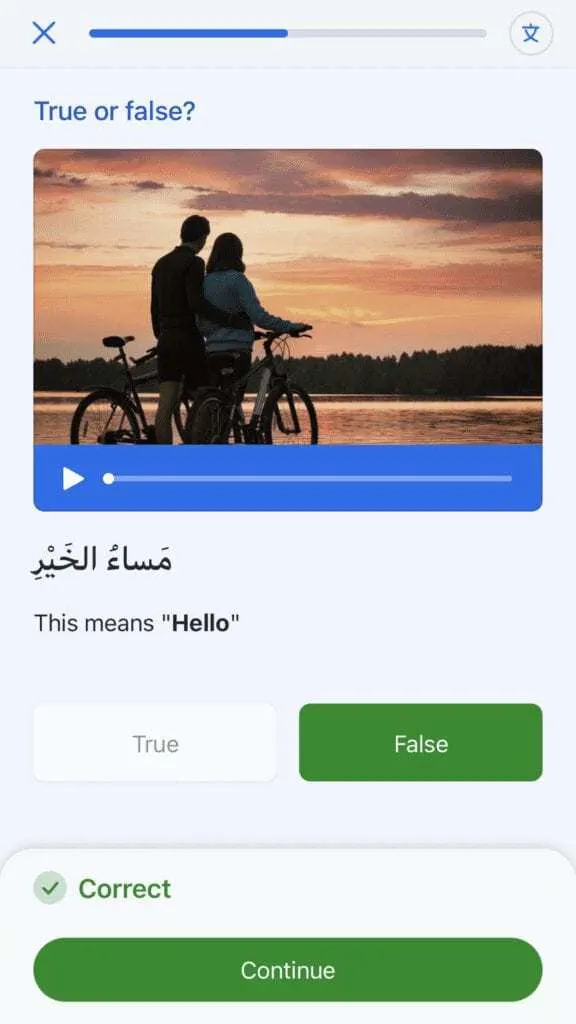
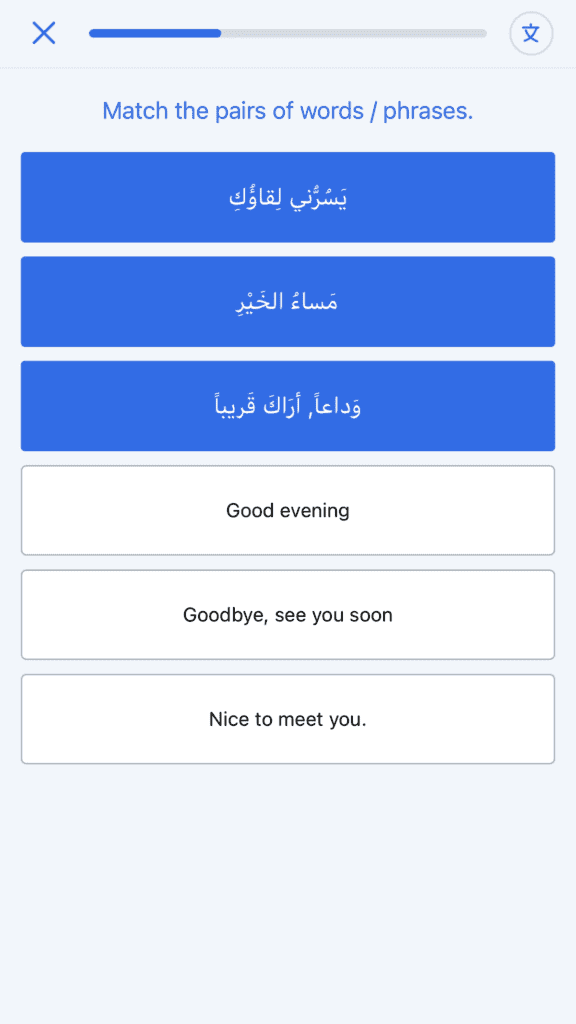
Perhaps the most interesting feature of Busuu is the community feature, which allows you to connect with other language learners. You can correct them, or they can correct you, both in spoken and written form.
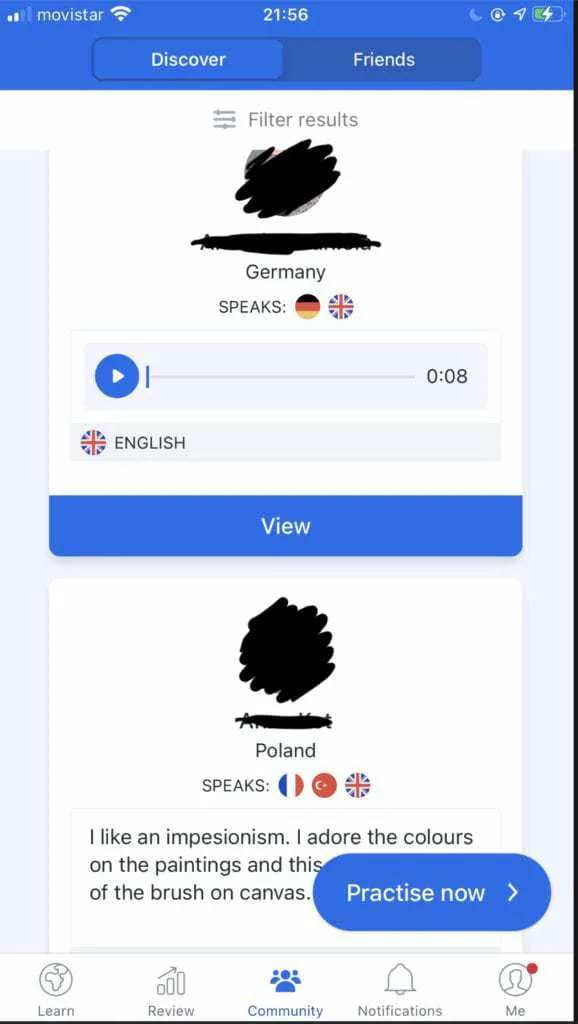
Beyond that, it is a decent app and I certainly think it can help you learn a language. If the community feature seems particularly interesting to you, I would recommend it, if not, I would try another app.
► Mondly
Free: Basic course and daily lesson
Pricing: €9.99/month
Rating: 7/10
Interesting features:
- Chatbot to practice conversations with
- Themed content
- Augmented reality teacher
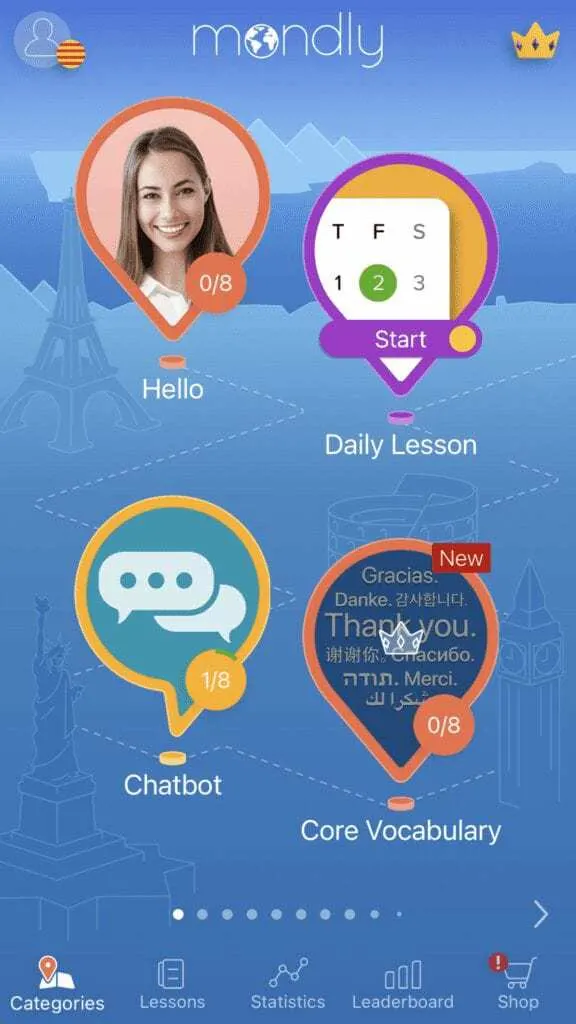
You can personalize your interests and pick from various themes including travel, romance, school, and business. My favorite part may be the bot you can have a conversation with.
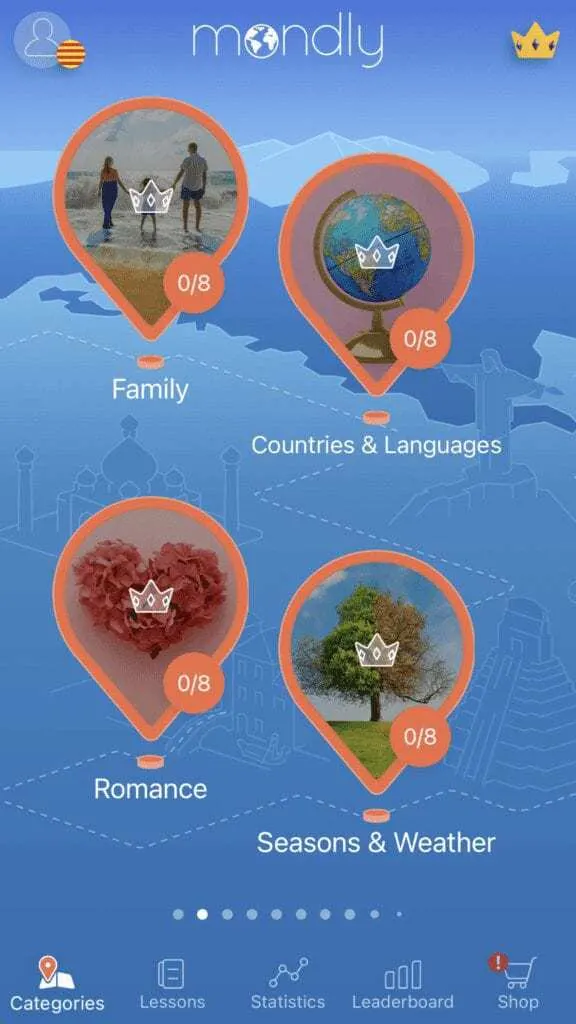
Perhaps the most interesting feature is the chatbot, which allows you to play out real-life conversations with a bot. The phrases come with translations, and you are given a few options to choose from, and you have to actually say the words into the microphone to hold the conversation.
Maybe it has been a while since I chatted with a bot, but I quite enjoyed this. The fact that you are given some options make it easy to play around and see what people could say in a conversation like this, rather than having to stick to one answer.
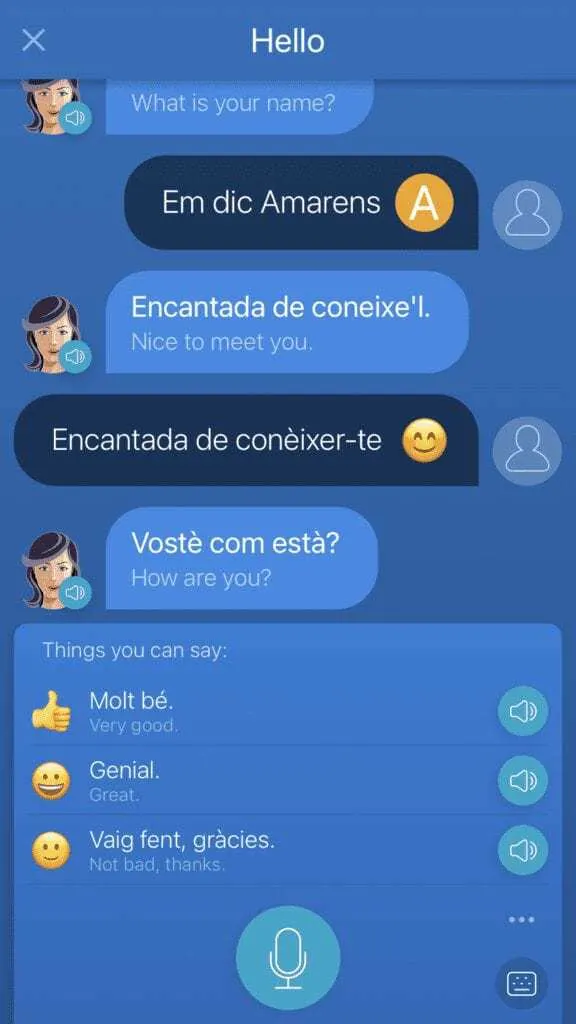
Something I wasn’t able to try out but I read about was the augmented reality teacher. It seems mostly like a novelty, but maybe that is what makes it interesting.
Overall, I would say this is a fun and decent app that can definitely help you learn Portuguese If you are into novelty tech things like chatbots and AR teachers, this is the app for you.
► Mango Languages
Free trial: 14 days
Pricing: $7.99 per month for 1 language, $17.99 for all
Rating: 9/10
Interesting features:
- Great selection of languages
- Free courses for minority languages
- Semantic color mapping
- Voice comparison
Mango Languages is one of my personal favorites. I love their selection of courses and I really enjoy the way the courses are set up.
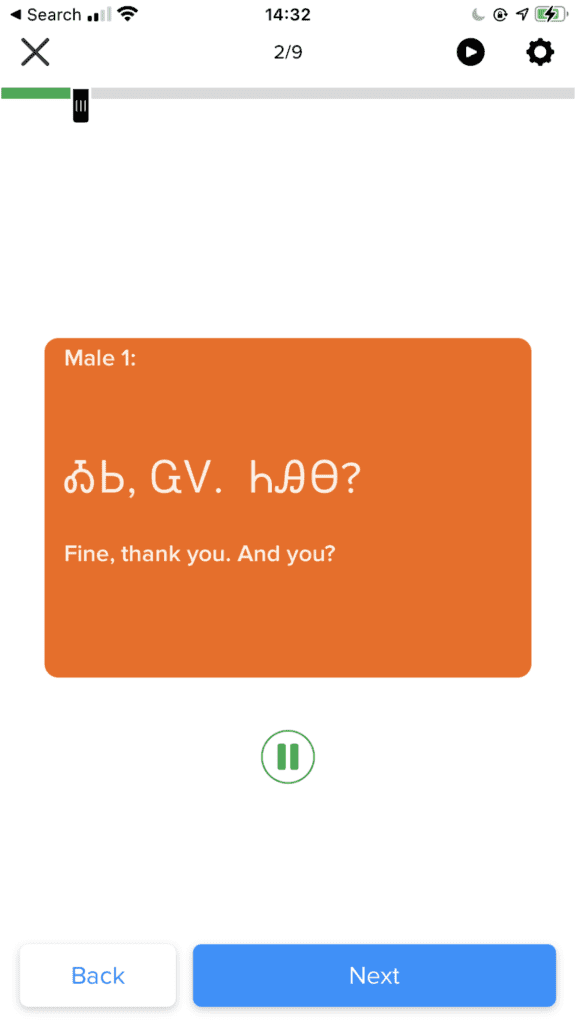
The lessons are set up as slides which include conversations, as well as some explanation about the language. It feels more extensive than most of the other language apps.
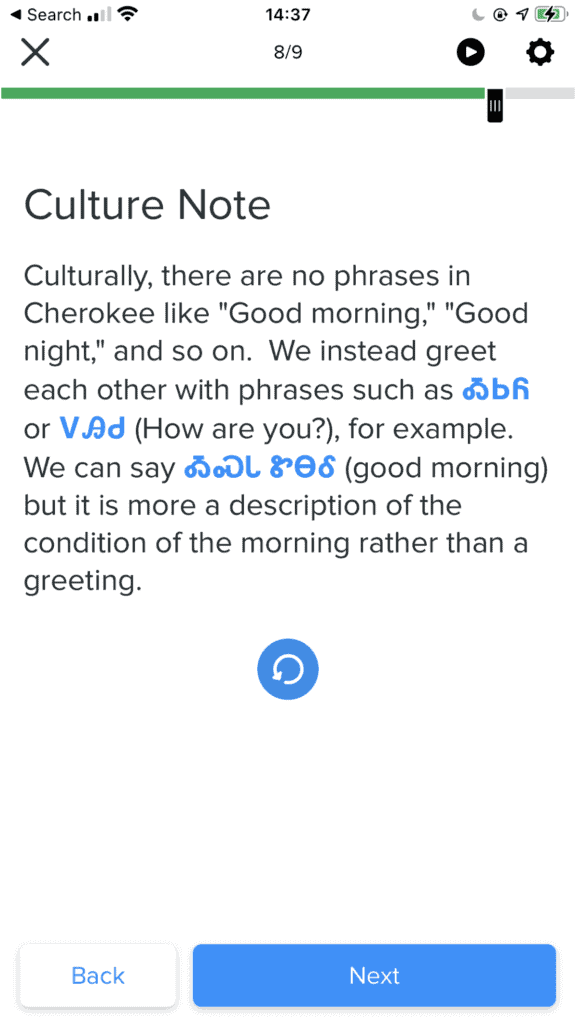
I think the cultural notes are quite helpful, because they make it feel like more of a complete course, but if you are looking for something easy to do on your commute to work this can be a little involved.
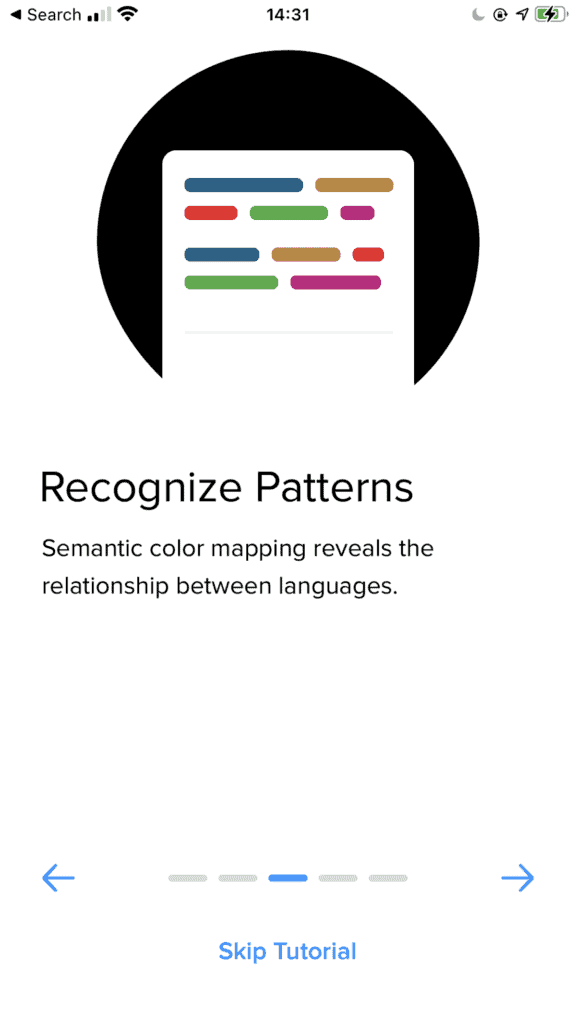
One of my favorite features is semantic color coding, which helps to establish what the syntactic structure is like. Some other apps provide just the literal translation, but I find the colors make it a lot easier to understand visually.
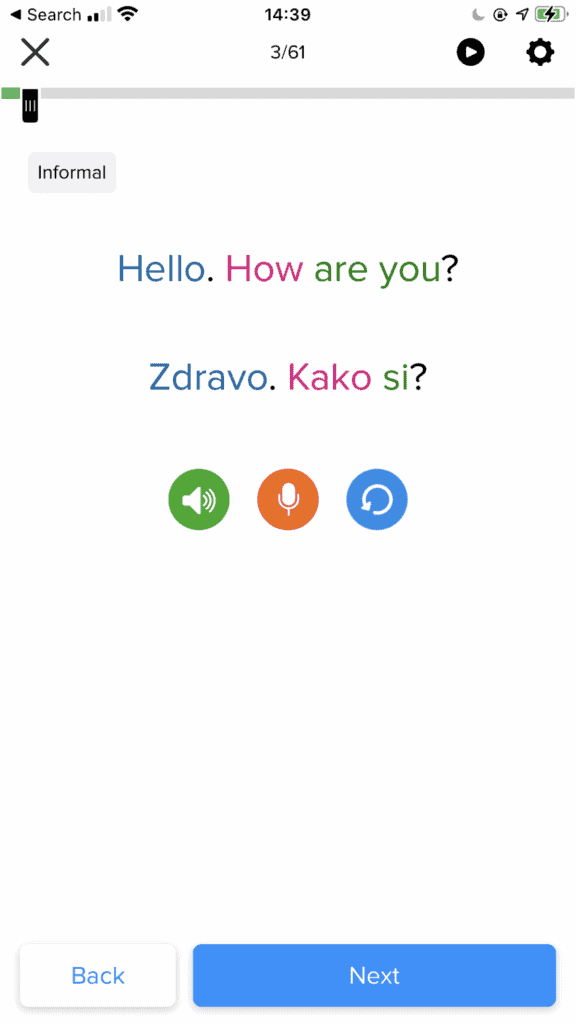
They give a nice overview of the grammatical elements you have learned in a lesson.
They offer certain minority languages (Cherokee, Hawaiian, Potawatomi, Tuvan) for free, which I think is great. Additionally, they also offer free courses in Ancient Greek, Pirate, and Shakespeare English.
A while back I used this app to learn Serbian and I really enjoyed it. For some reason it’s not as well-known as some other apps like Babbel, Duolingo and Memrise, but I think it deserves to be up there with them.
I’d say this is one of the best apps to learn Portuguese.
► HelloTalk
Free: Forever with restricted features
Premium: €6.99
Rating: 7/10
Interesting features:
- Language exchange
- Drops-like language course
HelloTalk is a great app to add to your repertoire if you want to start practising your skills.
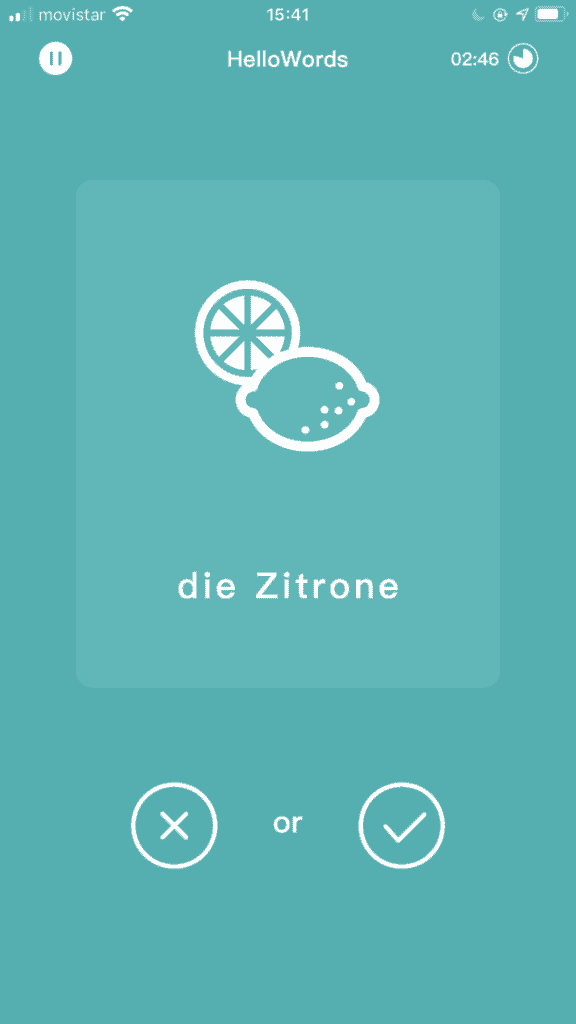
The courses look identical to drops. I am not sure this is done by contract, or if it is just a rip-off, but it is odd at the very least since I couldn’t find anything about any affiliation of the two apps online.
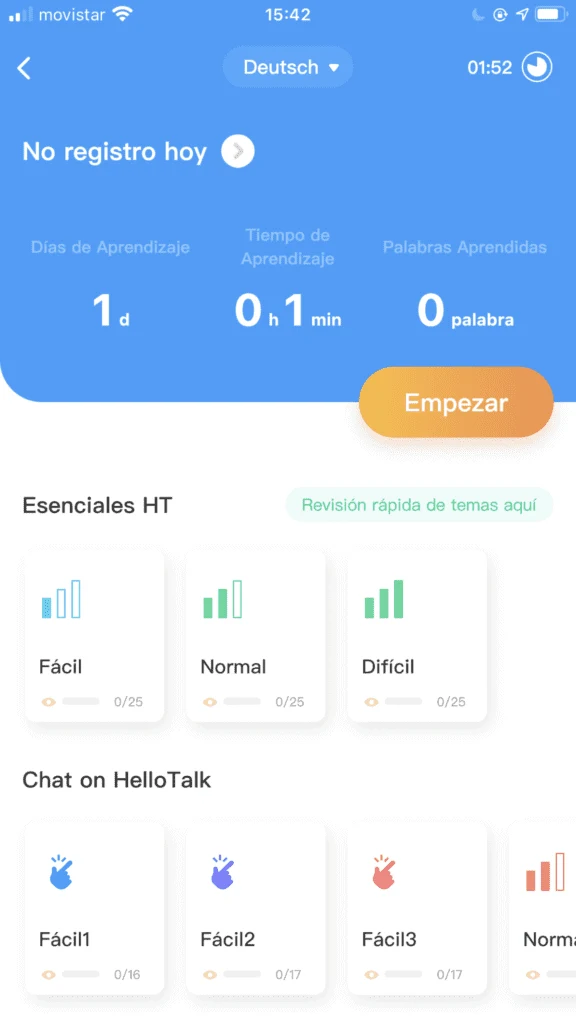
I think HelloTalk is a great addition to anyone’s language learning curriculum since it gives you a way to practise, but in reality, it can be hard to establish a functioning language exchange between people.
Conclusion on best apps to learn Portuguese
So now that you’ve got an overview of all of these apps and their functions, you can make a decision for yourself.
These are the best language apps to learn Portuguese out now, but depending on your needs one may be a better fit than another.
Personally, I would have to say Memrise, Drops, Mango Languages, and Babbel are the best apps to learn Portuguese.
